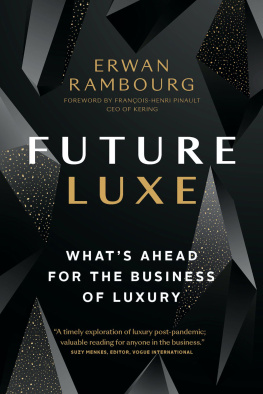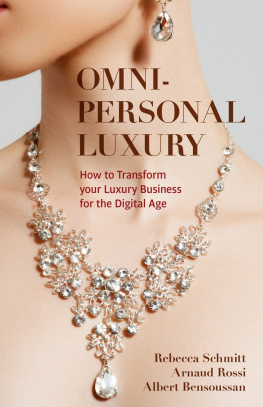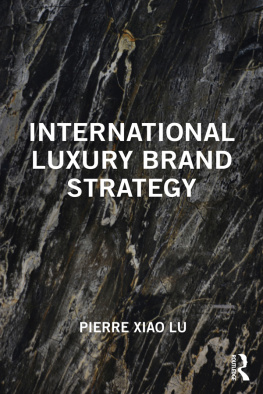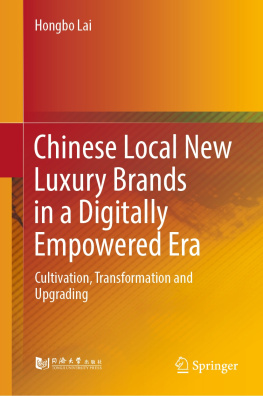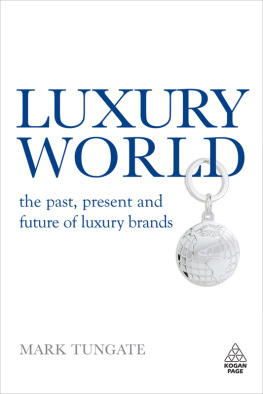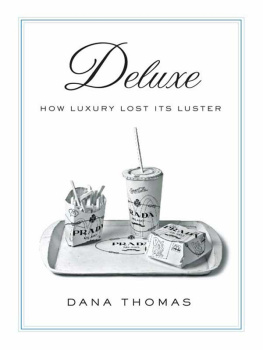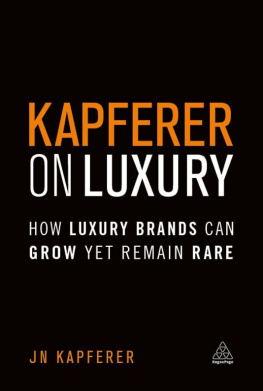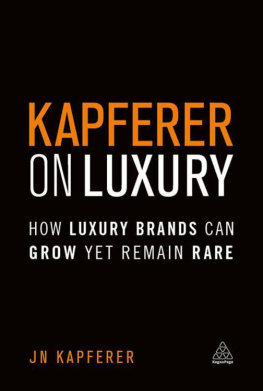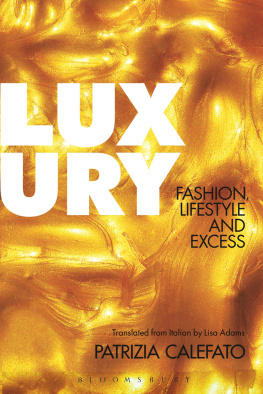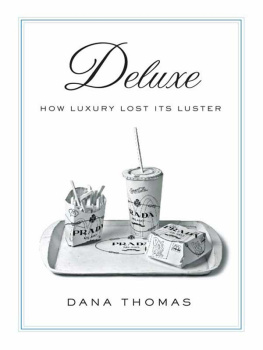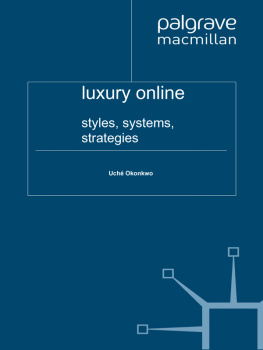Praise for Future Luxe
Erwan Rambourg points amazingly well to the new ideals that luxury will embody: inclusivity; a level of care for people and the planet that is both aspirational and essential; and a commitment to quality through sustainability and circularity.
Guillaume Le Cunff , CEO , Nestl Nespresso S.A.
Erwan Rambourgs long awaited new book comes at a time when the worlds of retail and luxury are going through unprecedented changes. His insights about the effects of COVID - 19, his predictions about the luxury sector in China, and his knowledge of the retail and luxury industries are second to none. A must read!
Ashley Galina Dudarenok , China marketing expert, LinkedIn Top Voice, three-time bestselling author, founder of ChoZan and Alarice
An inspiring read. Rambourg captures the essence of trends were seeing across the fascinating world of luxury, and provides practical, strategic advice alongside important insights into the future.
Sandrine Crener , Program Director, Harvard Business School
Tapping into his deep knowledge, extensive experience and vast network of industry leaders, Rambourg provides an insightful roadmap to navigating the global world of retail and luxury beyond the immediate aftermath of the COVID - 19 pandemic, into the end of our decade. His analysis of the fundamental shifts in this field is a must-read for anyone who wants to succeed in this sector.
Ketty Pucci-Sisti Maisonrouge , Adjunct Professor, Columbia Business School; President, Luxury Education Foundation; luxury entrepreneur
As an independent company, we always look for ways to benchmark our strategies and results, to check our convictions against others, and simply to broaden our horizons. The insight provided by Erwans analyses is invaluable!
Jean Cassegrain , CEO , Longchamp
Preface
The Life of Luxury after COVID - 19
I wrote the bulk of this book in 2019, before the novel coronavirus ( COVID - 19) emerged to engulf the world in a pandemic. As you can imagine, I made many revisions through July 2020 as cities around the world shut down and air travel ground to a halt.
Why think about the next decade in luxury when half of the world is living in confinement and fear? Who can imagine consumers will even think about buying high-end, seemingly useless products when they are busy panic-buying staples like pasta, toilet paper, and milk? Who would even think about a Rolex watch or a Chanel handbag as equity markets collapse, unemployment soars, and fatalities escalate? In the U.S., following the shocking death of George Floyd from police brutality and the mass protests that ensued, in a country facing its own pandemic of blatant race inequality, who in their right minds wouldnt feel guilty about purchasing high ticket items?
These are all fair questions of course. As we have learned to become familiar with new expressions such as super-spreader or flattening the curve and new concepts and habits such as WFH (working from home) and using Zoom or WhatsApp for videoed happy hour with friends, so will the luxury sector learn to evolve and adapt. Luxury brands will have to learn a new vocabulary, observe new rules, and remain open-minded as to what the circumstances might bring about. As Henry Kissinger once said, a diamond is just a chunk of coal that did well under pressure. If luxury brands do away with complacency, COVID - 19 may well prove, in hindsight, to have been a catalyst for positive change, made possible by creativity, optimism, and resolve.
I have ventured throughout the book to imagine what the virus aftermath may be in luxury. In essence, I believe that the outbreak and its impacts on consumer behavior will accelerate existing trends.
Some consequences of the pandemic are quite straightforward. Chinese consumers are, and will remain, the key constituent for the luxury sector. The rapid stabilization of COVID - 19 cases in China in March 2020, only two months after the onset, implies that Chinese nationals have been the first to come back to premium consumption. The virus episode has proved to be short lived for them, and confidence has rebounded quickly. The trend to consolidation in the luxury industry and the advantages that scale confers will be amplified. The smaller independent brands will suffer more from demand coming to a halt in the spring of 2020. And mergers and acquisitions in the luxury sector should be well supported as the bigger groups continue to aggregate market share.
Some other implications of the virus will come across as counterintuitive. For example, as quarantine conditions reduce the barriers to online shopping, it may seem reasonable to expect luxury consumers will make the bulk of their purchases online. I argue that luxury will be an exception to that rule because its attributes are incompatible with the principle of social distancing. Luxury will be sold predominantly in stores, not online, even in a post- COVID - 19 world.
The most important long-term implication of the virus is on consumer conscience and values. The world likely faces way worse threats than COVID - 19even though it may not have felt this way in 2020with climate change being the most obvious one. I do not subscribe to the idea that luxury will be a victim of a sort of quarantine of consumption. COVID - 19 has a silver lining of sorts, one that will build on a movement that has already gained strength in recent years: consumers, mostly driven by youth and women, will be more thoughtful about their choices and increasingly buy less but buy better. Luxury clients are likely to ask more questions. Environmental, social, and governance concerns will be under heavier scrutiny, supply chain substitutes will emerge, a circular economy of luxury could develop, and brands will thrive to become more trustworthy.
See, its not all bad.
Erwan Rambourg
New York, NY
July 2020
Foreword
C hina has been widely acknowledged to be one of the lead-ing drivers of the sustained growth in the luxury sector. Six years ago, in his previous book, The Bling Dynasty, Erwan Rambourg had the foresight to announce that this was more than just a trend but was a structural and therefore lasting phenomenon. Even today, and in spite of the COVID - 19 crisis, the Chinese market represents a substantial long-term reservoir of growth. If we look back, while this has not altered the ties between the major houses and their home countries, it has led to a shift in the center of gravity for our sector.
Taking his argument further, the author rightly underlines that this move towards Asia is not the only structural force to be changing the key balances within the luxury industry.
To varying degrees, the sector as a whole has benefited considerably from changes in consumer behavior among the new generations, irrespective of geography. Initially viewed as something ephemeral, the appetite of Millennials around the world for luxury products has proved more sustainable than expected by some industry observers. This is evidence, if it were needed, that this inclination is the result of a fundamental shift in society, driven by changes in the way of life of young adults, the growth in their discretionary spending, and the new social identities embraced by consumers. These trends will continue beyond the economic slowdown triggered by COVID - 19.
Among the factors contributing to this new generation of clientele for luxury brands is the rise of social networks, within the broader context of the digital revolution. The authors comments on the selfie generation reflect what is for me a deeply held belief: that modern luxury, enriched by genuine, interactive creativity, will continue to enable individuals to assert themselves and to express their unique personalities. Successful houses are able to provide a response to this fundamental need.
Next page
